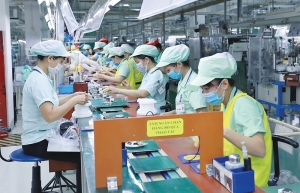US chipmakers hit ground running with Vietnam plans
In mid-May, the US-based chip designer Marvell Technology announced that it had increased its presence in Vietnam along with the size of its workforce in the past year. Indeed, Marvell has been in Vietnam for 10 years, but the company has grown its footprint in the past two years due to the AI boom.
 |
| A microchip manufacturing ecosystem is being created through skills training and foreign partnerships, Photo: Shutterstock |
Quang-Dam Le, general director of Marvell Technology Vietnam, told VIR that Vietnam is rapidly becoming a centre of semiconductor innovation, and Marvell is committed to being part of that.
“We believe that Vietnam is a strategic location for the development of engineering talent and is dedicated to continued growth in the country with the hiring of more talent, the opening of our world-class design centre in Ho Chi Minh City and a new location in the central city of Danang, and continued investment in developing essential technology skills in the region via the Marvell Excellence Scholarship Programme in Vietnam,” Le said.
Marvell continues to invest in advancing technologies as part of its mission to bring leading-edge silicon solutions for the cloud data centre, carrier, automotive and enterprise markets. Its portfolio is ideally suited to drive accelerated infrastructure for AI deployments, and Vietnam will play an important role in advancing semiconductor innovation.
“Marvell’s work in Vietnam is primarily focused on high-speed data centre optical connectivity, storage, and analog and mixed-signal semiconductor technology. These are all essential technologies to scale AI infrastructure and Vietnam brings valuable engineering capability in a key geography,” Le added.
Likewise, US chipmaker Nvidia has also partnered with Vietnamese enterprises as part of its efforts to boost presence across Asia. At the end of May, GreenNode, a member of VNG Digital Business, joined forces with Nvidia and other global partners to advance generative AI capabilities across Asia-Pacific. GreenNode will enjoy priority access to Nvidia’s premier chips and AI Factory solutions, enhancing its service offerings.
Since April, GreenNode’s data centres in Thailand and Vietnam have been equipped with thousands of high-performance Nvidia H100 GPUs. These facilities offer efficient and rapid training of large language models, significantly accelerating the delivery of generative AI solutions to businesses.
In April, FPT also entered into a comprehensive strategic partnership with Nvidia to bolster its AI and cloud capabilities in service offerings and workforce training. FPT plans to invest $200 million in building an AI factory that will feature Nvidia’s latest technologies.
The partnerships deepen Nvidia’s presence in Asia months following CEO Jensen Huang’s visit to the region including Vietnam, Malaysia, and Singapore in December last year.
The CEO discussed partnerships with executives from Vietnam’s leading companies like FPT and VNG. The US chipmaker is also expected to do more business in Vietnam as the country develops its semiconductor industry.
Le Minh Tien, director of Technology Solutions Consulting at Grant Thornton Vietnam, said, “The arrival of US chipmakers like Marvell and Nvidia in Vietnam injects a positive jolt into the nation’s semiconductor industry. These companies bring significant capital and expertise, accelerating Vietnam’s growth in this sector. Collaborations with established players like Nvidia integrate Vietnam into global supply chains, leading to increased production volume and global recognition.”
Additionally, the influx creates fertile ground for Vietnamese startups to develop innovative chip-related products and services.
“Furthermore, as US companies establish operations, they’ll likely adhere to international quality and safety standards, raising the overall quality of Vietnam’s chip production and making it more competitive globally,” Tien added.
Vietnam’s supply chain role
Vietnam has also attracted a number of other US semiconductor companies, such as Intel, Qualcomm, Synopsys, and Amkor. The expansion of US semiconductor and chip-making companies is a testament to the attractiveness of the Vietnamese market in the global supply chain.
Lim Dyi Chang, head of commercial banking at UOB Vietnam, said, “Vietnam’s emergence as a hub for semiconductor investment reflects a strategic alignment with the global demand for high-tech products. Vietnam’s semiconductor exports, reaching $562 million between February 2022 and February 2023, position it as the third-largest Asian supplier to the US after Malaysia and Taiwan, according to the UOB Quarterly Global Outlook for Q2.”
The lifting of Vietnam’s relations to a comprehensive strategic partnership with the US in September 2023 further catalyses a new wave of semiconductor investments. Despite the growth in foreign direct investment, Vietnam recognises the importance of developing domestic capacity concurrently, he added.
Additionally, the Vietnamese government actively supports the development of the semiconductor industry through infrastructure development, tax breaks, and workforce training programmes, noted Tien from Grant Thornton.
“This creates a business-friendly climate with a streamlined bureaucracy and attractive investment policies, making it easier for foreign companies to set up shop,” Tien said. “With proper training, the workforce can become a valuable asset for the semiconductor industry, as evidenced by the recent increase in STEM graduates in Vietnam.”
It is worth noting that the US is collaborating closely with Vietnam in its CHIPS Act outreach programme to help Vietnam expand its worldwide semiconductor ecosystem, including production and distribution outposts. Vietnam ranks third in semiconductor exports to the US, and the US-Vietnam Comprehensive Strategic Partnership included $2 million in funding from the US to help Vietnam develop its semiconductor workforce.
Unlocking potential
Vietnam aims to become a key player in the global semiconductor industry. Thus, a skilled engineering team plays a vital role in fulfilling the quality and quantity requirements of the semiconductor industry.
Le from Marvell is upbeat about the outlook of Vietnam’s semiconductor industry, which has grown from a centre of excellence in assembly and testing to now include semiconductor design.
Marvell’s Vietnam offices played a critical role in designing a number of storage devices already on the market. Successfully executing many projects in the past 10 years, Vietnamese engineers have demonstrated their strong technical knowledge and expertise covering all stages in integrated circuit design flow.
“These are high-skill tasks which contribute significantly to Marvell success. Vietnam brings valuable engineering talent and continued opportunities to grow high-value semiconductor jobs, careers, and an ecosystem in the country,” he said.
Nguyen Anh Tuan, chairman of the Ho Chi Minh City Semiconductor Technology Association, said that the world is facing a shortage of semiconductor workforce.
“This is also particularly true in Vietnam, where the local semiconductor workforce only meets one-tenth of the demand. It is imperative to develop personnel for this industry when Vietnam has attracted more investments in semiconductors,” he said.
Indeed, the expansion of US chipmakers can significantly contribute to Vietnam’s ambitious goal of training 50,000 semiconductor engineers by 2030.
According to Tien of Grant Thornton, US chipmaking companies are likely to provide on-the-job training programmes for their Vietnamese workforce, addressing the skill gap and creating a pool of qualified engineers. Furthermore, partnerships between US companies and Vietnamese universities can develop specialised curriculum and research opportunities, fostering a strong research and development (R&D) ecosystem.
“The collaboration between the National Innovation Centre of Vietnam, Synopsys, and the University of Arizona for human resource development in the semiconductor industry is a prime example,” he said.
“Additionally, the Vietnamese government can partner with US companies to develop targeted training programmes aligned with industry needs, ensuring graduates possess the specific skills required for the jobs available. Offering tax breaks and funding for research projects focused on semiconductor technology can also encourage universities and private companies to invest in R&D, fostering innovation in the domestic industry,” he added.
| Vietnam to become key link in semiconductor value chain The Vietnamese government provided positivity and expectation for the country to develop its semiconductor industry at a pivotal conference on April 24 focusing on human resource development. |
| Semiconductor success in reach with investment During the InnovaConnect event organised in April, Lee Young Hee, director of the Center for Integrated Nanostructure Physics at the Institute for Basic Sciences at Sungkyunkwan University, and Park Inkyu, head professor at the Department of Mechanical Engineering at the Korea Advanced Institute of Science and Technology, shared their insights with VIR’s Hoang Minh about Vietnam’s advantages in developing the semiconductor industry, as well as trends in the industry that the nation should pursue. |
 | Technology giants keen to embrace gifted engineers Many excellent Vietnamese students could soon have opportunities to improve their knowledge and work in microchips and semiconductors at research and development centres of tech groups such as Samsung and Hana Micron. |
 | Vietnam welcomes Indian interest in hi-tech and semiconductor sectors The Vietnamese government opens its arms to Indian entrepreneurs and businesses to invest in high-technology, semiconductors, and digital technology, according to Deputy Minister of Information and Communications Bui Hoang Phuong. |
| Hung Yen prioritises Taiwanese semiconductor enterprises to invest in IP No. 5 A business delegation from the Taiwan Electrical and Electronic Manufacturers' Association (China) on May 22 came to the northern province of Hung Yen to seek investment opportunities. |
What the stars mean:
★ Poor ★ ★ Promising ★★★ Good ★★★★ Very good ★★★★★ Exceptional
Related Contents
Latest News
More News
- SK Innovation-led consortium wins $2.3 billion LNG project in Nghe An (February 25, 2026 | 07:56)
- THACO opens $70 million manufacturing complex in Danang (February 25, 2026 | 07:54)
- Phu Quoc International Airport expansion approved to meet rising demand (February 24, 2026 | 10:00)
- Bac Giang International Logistics Centre faces land clearance barrier (February 24, 2026 | 08:00)
- Bright prospects abound in European investment (February 19, 2026 | 20:27)
- Internal strengths attest to commitment to progress (February 19, 2026 | 20:13)
- Vietnam, New Zealand seek level-up in ties (February 19, 2026 | 18:06)
- Untapped potential in relations with Indonesia (February 19, 2026 | 17:56)
- German strengths match Vietnamese aspirations (February 19, 2026 | 17:40)
- Kim Long Motor and AOJ Suzhou enter strategic partnership (February 16, 2026 | 13:27)

 Tag:
Tag:



















 Mobile Version
Mobile Version